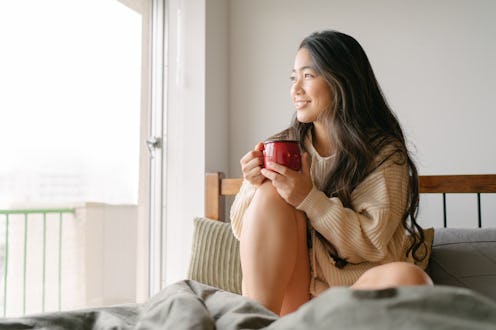(Wellness)
I Stopped Drinking Alcohol During The Week — And Started Sleeping So Much Better

Given that sleep is hard for millions of people, I didn't really give it another thought when I started having trouble with it myself. To be clear, I've always struggled to doze off (I largely chalk that up to my anxious brain). But in the past few years, I've found it difficult to stay asleep, too. And while I thought it was just an inevitable result of getting older, as it turns out, it may have just been the effects of alcohol — something I only realized when I recently cut it out of my weekday schedule completely.
I've actually never been much of a drinker; since I started consuming alcohol in college, it was always pretty typical of me to indulge in a few glasses on the weekend and then forget about it completely the rest of the time. That changed slightly, though, as I felt more and more stress from my career. I never felt like I was overindulging, per se, but over time I went from the occasional drink on Fridays and Saturdays to a beer or two almost every night.
Besides considering that some of the ingredients in the alcoholic drinks I was consuming (i.e. gluten, sugar, etc.) might be bad for my body, I never really gave my increased consumption a second thought. That is, until I decided to stop drinking during the week in an effort to be more healthy and noticed a sudden change in the quality of my sleep.
Shockingly (to me, at least), the difference was drastic. Almost instantly, I stopped waking up throughout the night. And while I never have an easy time getting out of bed in the morning, I did start feeling less groggy and anxious when I woke up.
According to Ruby Mehta, LCSW and Director of Clinical Operations at digital recovery program Tempest, what happened in my situation actually made perfect sense. "Although many people drink alcohol in order to fall asleep, there is a lot of research that shows alcohol, even in small quantities, is actually disruptive to sleep," she tells TZR in an email.
According to Mehta, there are a few reasons for this. While alcohol can help people fall asleep faster, it actually interrupts and shortens the two phases of restorative sleep, i.e. REM and non-REM sleep cycles, especially during the second half of the night. Drinking can also tamper with our natural sleep cycle because it changes the body's internal temperature and chemistry, which it relies on to prepare it for sleep. And finally, explains Mehta, "since alcohol relaxes our muscles, we are more prone to sleep apnea after drinking alcohol, which also diminishes the quality of our sleep."
With all of that knowledge, though, I was still curious as to why such a small amount of alcohol was having such a big impact on my sleep. I was only having one to two drinks per night — could that really be the problem?
According to Mehta, yes. While she explains that a person's quality of sleep diminishes with the amount of alcohol consumed, it also matters what time someone drinks as well. "Even one drink close to bedtime would have an impact on sleep quality." That's especially true, she continues, if your sensitivity to alcohol is higher (which is definitely accurate in my case).
While this is all useful information for anyone interested in changing their drinking (and sleeping) habits, I recognize that it's not easy for every to just quit alcohol cold turkey. Though Mehta says it's typically safe to stop completely if you're only consuming one to two drinks a day, it can still be difficult to kick the habit if you're used to relying on that to fall asleep every night.
So, she recommends finding a new way to help yourself. "At Tempest, we encourage creating a relaxing night ritual," she says. "This could include things like doing a brief meditation, taking a bath or shower, listening to calming music, drinking herbal tea, or anything else that helps your body relax and prepare for bed." And, if you do notice any symptoms of alcohol withdrawal (like shakiness, nausea, tremors, restlessness, etc.), you should check in with your doctor.
I won't lie and say that I'm never going to drink again. I find joy in kicking back with a glass of wine after a particularly stressful work day, and I love indulging in a few IPAs with my husband on the weekends. But cutting back on weeknights has not only changed my sleep — it's improved my mood, my focus, and my work. So for me, practicing a little restraint with alcohol feels like a worthy endeavor I plan to continue.
Studies referenced:
Stein, M., & Friedmann, P. (2005, March). Disturbed sleep and its relationship to alcohol use. Retrieved January 14, 2021, from https://www.ncbi.nlm.nih.gov/pmc/articles/PMC2775419/
Scanlan, M., Redman, P., Roebuck, T., Little, J., & Naughton, M. (n.d.). Effect of moderate alcohol upon obstructive sleep apnoea. Retrieved January 14, 2021, from https://pubmed.ncbi.nlm.nih.gov/11153591/
This article was originally published on